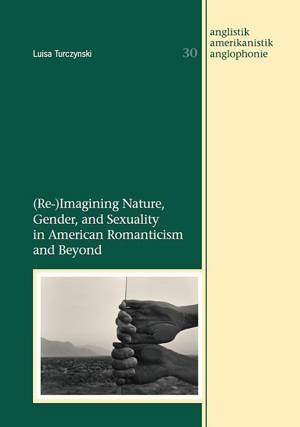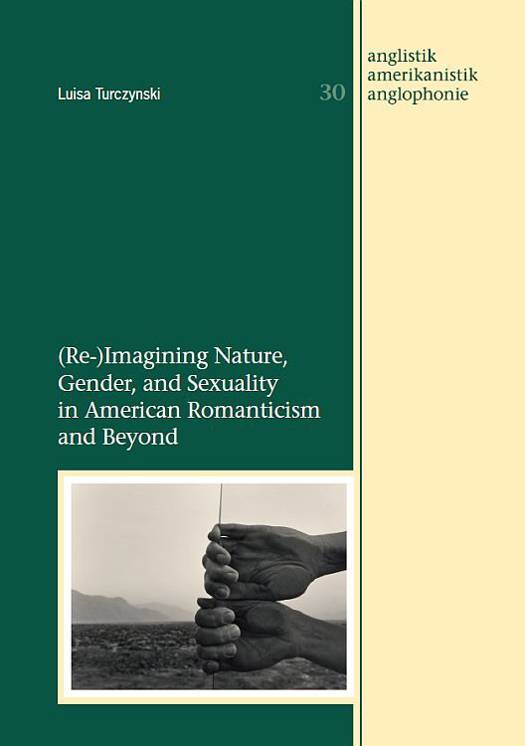
- Retrait gratuit dans votre magasin Club
- 7.000.000 titres dans notre catalogue
- Payer en toute sécurité
- Toujours un magasin près de chez vous
- Retrait gratuit dans votre magasin Club
- 7.000.000 titres dans notre catalogue
- Payer en toute sécurité
- Toujours un magasin près de chez vous
(Re-)Imagining Nature, Gender, and Sexuality in American Romanticism and Beyond
Luisa Turczynski
29,95 €
+ 59 points
Description
This study is concerned with the continuity between the Romantic conception of nature and contemporary Euro-American environmental discourses and literary practices. More specifically, it examines how conceptual and representational paradigms of the Romantic self-nature relationship have modeled ecocritical and ecofeminist thinking as well as nature-related writing by female Anglophone authors of the last three decades.
At first glance, the research interest in Romantic legacies within the collective environmental imagination might seem outdated, for it has shaped the fields of ecocriticism and ecofeminism since their institutionalization. However, these fields typically operate with a binary distinction between Romantic, anthropo- and androcentric modes of nature writing and feminine-coded, relational, and eco-centric rewritings that flowered at the turn of the twentieth century. Arguing that this gender-specific differentiation diminishes the complexity of Romantic writing and undermines a cornerstone of ecofeminist theory, this study revisits the polarized literary traditions from a model-theoretical view.
After providing a cultural-historical outline of the transatlantic formation and colonialist utilization of the Romantic nature philosophy and aesthetics, this book systematizes ecocritical and ecofeminist readings into a model of the Romantic self-nature relation. Finally, analyses of three contemporary quest narratives of female and queer emancipation explore the continuity and subversive variation of the modeled paradigms in transnational contexts, probing their connectivity with ecological and feminist thought.
TABLE OF CONTENTS
1. Introduction 1
2. Negotiating Self, Nature, and Nation in American Romanticism 11
2.1 Conceptualizing Wilderness as a National Icon 14
2.1.1 The Aesthetics of the Sublime and the Spiritualized American Landscape 17
2.1.2 The American West: Birthplace of the New Nation 25
2.2 Narrating and Canonizing Nature in Revolutionary Times 34
2.2.1 The Pastoral Impulse: Reconciling Wilderness and Civilization 37
2.2.2 Romantic Nature Writing and Frontier Narratives of the American West 42
3. Reading Romanticism: Controversial Ecocritical Assessments Reconsidered 53
3.1 The Romantic Conception of Self and Nature - Reconciling Dualisms? 57
3.1.1 Affirmative Explorations of a 'Romantic Ecology' and its Transatlantic Reach 64
3.1.2 Ecofeminist Challenges to the Gendered Landscapes of Romantic Nature Poetry, Pastoralism, and Transcendentalist Nature Writing 76
3.2 Re-Modeling the Romantic Self-Nature Relation 89
3.2.1 Ecofeminist Reconceptualizations and their Essentializing Tendencies 91
3.2.2 Constructing a Model: Embracing Historical Continuity and Gender Complexity 104
4. Exploring a Sense of Place, Self, and Belonging: Rootedness and Wanderlust in Contemporary Quest Narratives of Female and Queer Emancipation 108
4.1 "I could only call it hell": The Troubled Search for Ancestral Ties to the Desert Landscape in Ibis Gómez-Vega's Send My Roots Rain (1991) 111
4.2 Creating a Place "where she belongs": Connections and Commitments to the Land in Barbara Kingsolver's Prodigal Summer (2000) 124
4.3 Travelling in Uncharted Territory: The Female Quest for Self and Solitude in Abi Andrews' The Word for Woman is Wilderness (2018) 138
4.4 Synopsis 151
5. Situating the Female Self Amidst a Complex Web of Interrelations 153
5.1 Cycles of Nature, Interdependencies, and a "Weave of Women" in the Blooming Desert of Send My Roots Rain 157
5.2 "Solitude is only a human presumption": Interwoven Lives in the Appalachian Ecosystem of Prodigal Summer 170
5.3 Rewriting Self and Nature
At first glance, the research interest in Romantic legacies within the collective environmental imagination might seem outdated, for it has shaped the fields of ecocriticism and ecofeminism since their institutionalization. However, these fields typically operate with a binary distinction between Romantic, anthropo- and androcentric modes of nature writing and feminine-coded, relational, and eco-centric rewritings that flowered at the turn of the twentieth century. Arguing that this gender-specific differentiation diminishes the complexity of Romantic writing and undermines a cornerstone of ecofeminist theory, this study revisits the polarized literary traditions from a model-theoretical view.
After providing a cultural-historical outline of the transatlantic formation and colonialist utilization of the Romantic nature philosophy and aesthetics, this book systematizes ecocritical and ecofeminist readings into a model of the Romantic self-nature relation. Finally, analyses of three contemporary quest narratives of female and queer emancipation explore the continuity and subversive variation of the modeled paradigms in transnational contexts, probing their connectivity with ecological and feminist thought.
TABLE OF CONTENTS
1. Introduction 1
2. Negotiating Self, Nature, and Nation in American Romanticism 11
2.1 Conceptualizing Wilderness as a National Icon 14
2.1.1 The Aesthetics of the Sublime and the Spiritualized American Landscape 17
2.1.2 The American West: Birthplace of the New Nation 25
2.2 Narrating and Canonizing Nature in Revolutionary Times 34
2.2.1 The Pastoral Impulse: Reconciling Wilderness and Civilization 37
2.2.2 Romantic Nature Writing and Frontier Narratives of the American West 42
3. Reading Romanticism: Controversial Ecocritical Assessments Reconsidered 53
3.1 The Romantic Conception of Self and Nature - Reconciling Dualisms? 57
3.1.1 Affirmative Explorations of a 'Romantic Ecology' and its Transatlantic Reach 64
3.1.2 Ecofeminist Challenges to the Gendered Landscapes of Romantic Nature Poetry, Pastoralism, and Transcendentalist Nature Writing 76
3.2 Re-Modeling the Romantic Self-Nature Relation 89
3.2.1 Ecofeminist Reconceptualizations and their Essentializing Tendencies 91
3.2.2 Constructing a Model: Embracing Historical Continuity and Gender Complexity 104
4. Exploring a Sense of Place, Self, and Belonging: Rootedness and Wanderlust in Contemporary Quest Narratives of Female and Queer Emancipation 108
4.1 "I could only call it hell": The Troubled Search for Ancestral Ties to the Desert Landscape in Ibis Gómez-Vega's Send My Roots Rain (1991) 111
4.2 Creating a Place "where she belongs": Connections and Commitments to the Land in Barbara Kingsolver's Prodigal Summer (2000) 124
4.3 Travelling in Uncharted Territory: The Female Quest for Self and Solitude in Abi Andrews' The Word for Woman is Wilderness (2018) 138
4.4 Synopsis 151
5. Situating the Female Self Amidst a Complex Web of Interrelations 153
5.1 Cycles of Nature, Interdependencies, and a "Weave of Women" in the Blooming Desert of Send My Roots Rain 157
5.2 "Solitude is only a human presumption": Interwoven Lives in the Appalachian Ecosystem of Prodigal Summer 170
5.3 Rewriting Self and Nature
Spécifications
Parties prenantes
- Auteur(s) :
- Editeur:
Contenu
- Nombre de pages :
- 226
- Langue:
- Anglais
- Collection :
- Tome:
- n° 30
Caractéristiques
- EAN:
- 9783989400436
- Date de parution :
- 12-09-24
- Format:
- Livre broché
- Dimensions :
- 150 mm x 14 mm
- Poids :
- 425 g







